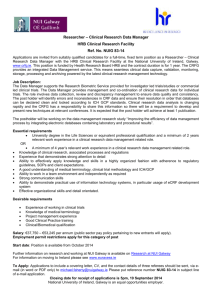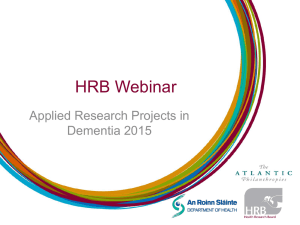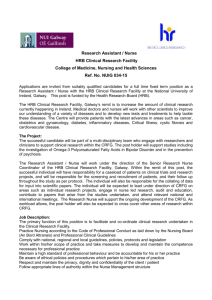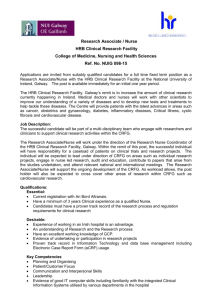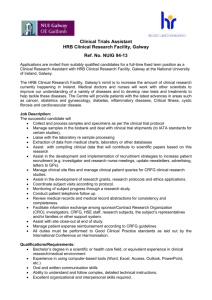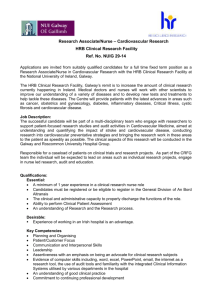IRELAND
advertisement
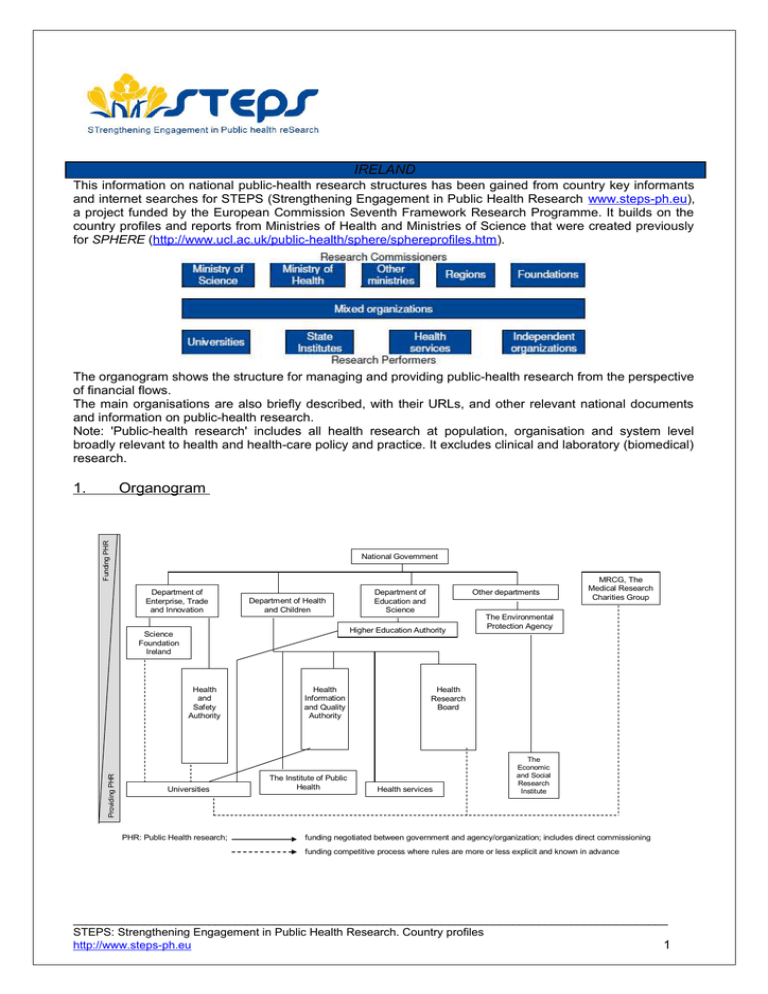
IRELAND This information on national public-health research structures has been gained from country key informants and internet searches for STEPS (Strengthening Engagement in Public Health Research www.steps-ph.eu), a project funded by the European Commission Seventh Framework Research Programme. It builds on the country profiles and reports from Ministries of Health and Ministries of Science that were created previously for SPHERE (http://www.ucl.ac.uk/public-health/sphere/sphereprofiles.htm). The organogram shows the structure for managing and providing public-health research from the perspective of financial flows. The main organisations are also briefly described, with their URLs, and other relevant national documents and information on public-health research. Note: 'Public-health research' includes all health research at population, organisation and system level broadly relevant to health and health-care policy and practice. It excludes clinical and laboratory (biomedical) research. Organogram Funding PHR 1. National Government Department of Enterprise, Trade and Innovation Department of Health and Children Other departments Higher Education Authority Science Foundation Ireland Health and Safety Authority Providing PHR Department of Education and Science Universities PHR: Public Health research; Health Information and Quality Authority The Institute of Public Health MRCG, The Medical Research Charities Group The Environmental Protection Agency Health Research Board Health services The Economic and Social Research Institute funding negotiated between government and agency/organization; includes direct commissioning funding competitive process where rules are more or less explicit and known in advance ____________________________________________________________________________________________ STEPS: Strengthening Engagement in Public Health Research. Country profiles http://www.steps-ph.eu 1 2. Research Commissioners 2.1 Ministry of Health The Department of Health and Children (DoHC, http://www.dohc.ie/) primarily funds health research via its statutory agency the HRB. It also commissions public health research directly in the policy-supportive areas of children’s health and well-being, health of the traveller community, and practice and standards in health care provision. The DoHC provides a small number of scholarships and fellowships each year for research in these areas. The Office of the Minister for Children and Youth Affairs (www.omc.gov.ie) has lead responsibility for the implementation of a national children’s research programme. The main aim of this programme is to facilitate the achievement of a better understanding of how children grow up in Ireland, including both their individual and shared needs. The overall programme comprises, capacity building, the development of a data and research infrastructure around children’s lives and a commissioned research programme. Within each of these areas, public health is a core focus. 2.2. Ministry of Science Department of Enterprise, Trade and Employment, http://www.entemp.ie/ 2.2.1. The Science Foundation Ireland (http://www.sfi.ie/home/index.asp) is one of the agencies that implement the Office of Science, Technology and Innovation strategy (http://www.entemp.ie/science/technology/; Strategy for Science, Technology and Innovation 2006-2013) through a range of schemes and programmes. SFI will continue to invest in academic researchers and research teams in the fields of science and engineering underpinning three broad areas: Biotechnology; Information and communications technology; Sustainable energy and energy-efficient technologies. 2.2.2. The Higher Education Authority (HEA, http://www.hea.ie) through its Programme for Research in Third Level Institutions (PRTLI) the HEA provides significant multi-annual and multi-cycle infrastructure funding to the higher education sector to underpin the research supported by other Irish public funding agencies. A considerable proportion of PRTLI funding has been directed towards health-related research, either through the provision of physical facilities for research activity, recurrent funding support for projects within those facilities or establishment funding for Graduate Schools, a number of which train medical and health researchers. 2.3. Other ministries 2.3.1. The Department of Agriculture, Fisheries and Food (DAFF, http://www.agriculture.gov.ie/), via its public good research programme known as the Food Institutional Research Measure (FIRM), is the primary national funding body for food research in third level colleges and research institutes. Research areas funded by FIRM include Food Safety, Food and Health, Functional Foods and DAFF co-funds a number of food and health initiatives with the HRB. In addition, the Marine Institute, which receives its funding from DAFF, supports a small number of research projects in the area of marine food safety. 2.3.2. The Environmental Protection Agency (EPA, http://www.epa.ie/), via its research stream know as the Science, Technology, Research and Innovation for the Environment ____________________________________________________________________________________________ STEPS: Strengthening Engagement in Public Health Research. Country profiles http://www.steps-ph.eu 2 (STRIVE) Programme supports a number of public health projects, including environment and health, potable water quality, socioeconomic impacts of pollution, and environment impacts on health. This research is conducted primarily in the higher education sector and the environmental industry sector. The STRIVE programme is funded by the Irish Government under the National Development Plan 2007-2013. 2.4. Regions 2.5. Foundations 2.5.1. The Medical Research Charities Group (MRCG, http://www.mrcg.ie) is the umbrella group representing the joint interests of charities specialising in restoring health through medical research, diagnosis and treatment and, where possible, the prevention of disease. The MRCG provides significant funding annually for research. The majority of projects supported are basic biomedical or clinical/translational, although a collaborative programme between the HRB and MRCG funds across a broad range of projects in public health as it relates to health promotion, epidemiology, health interventions and measures. 3. Research Performers 3.1. State Institutes 3.1.1. The Institute of Public Health in Ireland (IPH, http://www.publichealth.ie/) promotes cooperation for public health on the island of Ireland through three key areas of work: Strengthening public health intelligence (Ireland and Northern Ireland’s Population Health Observatory); Building public health capacity (use of Health Impact Assessment); to tackle health inequalities (includes the establishment of a Public Health Policy Centre). The Centre for Ageing Research Development in Ireland (CARDI) is hosted by the Institute. 3.2. Mixed organizations 3.2.1. The Health Research Board (HRB, http://www.hrb.ie/) is the lead agency in Ireland supporting and funding health research. It also manages a number of national health information systems and provides trends analysis in nominated areas including alcohol and drugs, child health, disability and mental health. The HRB supports academic researchers and health professionals through research training and career development awards, project and programme awards, and infrastructure initiatives supporting health research. The HRB currently manages funding commitments worth over €170 million. Funding covers a broad range of health research areas from applied biomedical, translational, clinical and practice-based research, through to population health sciences and health services research. 3.2.2. The Health Information and Quality Authority (HIQA, http://www.hiqa.ie) undertakes or commissions research to support its work in quality assurance, accreditation, health technology assessment and health information. (Source: http://www.hiqa.ie/about_research.asp, assessed in March 2010) 3.2.3. The Health and Safety Authority (HAS, http://www.hsa.ie/eng/) is the national body in Ireland with responsibility for securing health and safety at work. The HSA also promotes education, training and research in the field of health and safety (undertakes and sponsors research on health and safety at work). ____________________________________________________________________________________________ STEPS: Strengthening Engagement in Public Health Research. Country profiles http://www.steps-ph.eu 3 3.3. Universities The bulk of public health research in Ireland takes place in the higher education institutions (universities and institutes of technology) and in affiliated university hospitals and research centres. Four universities have dedicated departments of Public Health (Trinity College Dublin, University College Cork, University College Dublin, and the Royal College of Surgeons in Ireland) while NUI Galway has a large Department of Health Promotion. Outside of these core departments, all Irish universities support some level of public health relevant research through other academic disciplines including Oral health, Health economics, Health psychology, Food and Health, Health services research, Health geography, Medical anthropology, Health technology assessment, Epidemiology, Public health medicine and nursing. 3.4. Health Services The Health Services Executive (HSE, http://www.hse.ie/eng/) is the national provider of health and social care services in hospitals and communities, with over 18,000 frontline, administrative and managerial staff. While the HSE does not manager a dedicated research budget, it undertakes public health research through its consultants in public health and allied health professionals with a remit in this area. While it is not possible to quantify the exact amount of research activity taking place within the hospital and primary care settings, a number of funding agencies provide support for such research. 3.5. Independent organizations 3.5.1. The Economic and Social Research Institute (ESRI, http://www.esri.ie/) produces research that contributes to understanding economic and social change and that informs public policymaking and civil society in Ireland and throughout the European Union. The Economic and Social Research Institute is a not-for-profit company. Total income in 2008 is estimated at €14.3 million. The Institute receives an annual grant-in-aid from the Department of Finance to support the scientific and public interest elements of the Institute's activities. Research in Health forms a fundamental part of the work of the ESRI. In particular, research projects/reviews/reports are provided for the major health agencies and government departments at the national level and for a wide range of international organisations, including the European Commission, the Organisation for Economic Cooperation and Development, the World Bank and the World Health Organisation. Current research covers a range of issues in the following areas: Health and Health Status; Health and Lifestyles; Health Care Services (Source: http://www.esri.ie/research/research_areas/health/?, assessed May 2010) 4. Research Strategies 4.1. Health Research Group Action Plan for Health Research 2009 -13 The Action Plan for Health Research was developed by the Health Research Group (HRG). The HRG was established in 2007 by the Ministers for Health and Children and Enterprise, Trade and Innovation. The Group's purpose is to ensure that health research in Ireland is coordinated, prioritised and focussed and that national policies and strategies for health research are framed strategically in the context of the wider science, technology and innovation agenda. (Source: http://www.dohc.ie/publications/pdf/action_plan_health_research.pdf?direct=1, assessed in March 2010) ____________________________________________________________________________________________ STEPS: Strengthening Engagement in Public Health Research. Country profiles http://www.steps-ph.eu 4 4.2. Health Research Board Strategic Business Plan 2010 – 2014: The future of Irish health research The HRB Strategic Business Plan was developed in tandem with the HRG Action Plan for Health Research and will see the HRB play a key role in the further development of health research capacity in Ireland, in particular in the areas of population health sciences and health services research. To underpin this, the HRB Strategic Plan outlines four clear supporting goals: Goal 1: Driving the development of excellent clinical research, including applied biomedical research, within a coherent health research system. Goal 2: Building capacity to conduct high quality population health sciences research and health services research. Goal 3: Working with key partners to develop and manage high quality national health information systems. Goal 4: Generating and synthesising evidence, and promoting the application of knowledge to support decision making by policy and relevant practitioners. (Adapted from: http://www.hrb.ie/about/corporate/corporate-strategy/, http://www.dohc.ie/press/releases/2009/20091104.html; http://www.hrb.ie/uploads/tx_hrbpublications/HRB_Strategy_2010-2014_01.pdf, Assessed in March 2010) 4.3. Strategy for Science, Technology and Innovation 2006-2013 (SSTI) The SSTI, published by the Irish government in 2006, provides a framework for investment in research across all sectors. The strategy recognizes the importance of health research to future economic and social development in Ireland. (Source: http://www.entemp.ie/publications/science/2006/sciencestrategy.pdf, assessed in February 2010) 4.4. Building Ireland’s Smart Economy: a Framework for Sustainable Economic Renewal Published by the Department of the Taoiseach in 2008, this important strategy recognises the crucial importance of health research to Ireland, in enhancing health and social wellbeing, developing better quality healthcare services, generating high-tech employment opportunities, and establishing Ireland as an international location for innovative health research and commercialisation (Source: http://www.taoiseach.gov.ie/eng/Building_Ireland's_Smart_Economy/Building_Ireland's_Smart_Economy_.p df, assessed July 2010) 4.5. Towards Better Health; Achieving a Step Change in Health Research in Ireland Published by the Advisory Science Council on Technology and Innovation (ASCTI) in 2006, this key strategy identifies health research as a key element in the development of the Irish health care system. The report saw that the benefits of a decade of investment in the higher education sector through the PRTLI could only be realised by translating this knowledge into new therapeutics and diagnostics through a health service that recognised research as a core function. (Source: http://www.sciencecouncil.ie/publication/ascSearch.jsp?ft=/publications/2006/title,3254,en.php., assessed July 2010) 4.6. The Economic and Social Research Institute Research Strategy 2008-2013: Research for a Changing Ireland The major developments in the strategy include: introduction of a new Research Framework focusing on Economic Growth, Social Progress and Environmental Sustainability; development of long-term programmes in all key research areas; increased ____________________________________________________________________________________________ STEPS: Strengthening Engagement in Public Health Research. Country profiles http://www.steps-ph.eu 5 focus on research in innovation, environment, migration, health and children; new dissemination strategy to increase ease of access to ESRI publications. (Source: http://www.esri.ie/about_us/the_institute/esri_research_strategy_20/) 4.7. The Health and Safety Authority (HSA) Strategic goals include “to develop a research programme on current, emerging and future high risk areas in workplace safety, health and welfare which will inform all our actions”. (Source: http://www.hsa.ie/eng/About_Us/Vision%20and%20Goals/, assessed in March 2010) 4.9. The Office of the Minister for Children and Youth Affairs A data and research strategy around children’s lives is currently being developed as part of the National Children’s Research Programme. It is expected that this strategy will be published in 2011. 5. Programmes and calls 5.1. Capacity building A number of programmes support capacity building in the disciplines relevant to public health research, through early stage PhD training, post-doctoral fellowships and career development and continuing professional development initiatives 5.1.1. Early-stage training The HRB PhD Scholars Programme supports annual cohorts of five to seven high-quality PhD students from a wide variety of disciplines, to be trained on four-year doctoral programmes with interweaved, individualised research training and skills-development opportunities. Both the HRB and more recently Molecular Medicine Ireland have provided for newly qualified doctors who are willing to step out of their clinical training in order to complete a PhD support (HRB Clinical Training Fellowship and MMI Clinical Scientist Fellowship). The HSE, together with the HRB, the Forum of Irish Postgraduate Medical Training Bodies and the university academic medical departments, have established an innovative fellowship programme, the ‘National SpR/SR Academic Fellowship Programme (NSAFP), which provides integrated training and a career path for clinical academics. Post-graduate fellowships may also be targeted at a specific sub-group of researchers. For example, the HRB Cancer Prevention and Health Economics Fellowships aim to encourage applicants to pursue careers in health economics and cancer epidemiology on the island of Ireland. The Department of Health and Children provides a small number of scholarships and fellowships each year for research the areas of children’s health and well-being, health of the traveller community, practice and standards in health care provision. The Office of the Minister for Children and Youth Affairs has a capacity building programme, one part of which is the award of PhD and Masters Scholarships. This programme includes all aspects of children’s lives, some of which relates to health. The 5th Cycle of the Programme for Research in Third Level Institutions (PRTLI), announced in July 2010, provides funding for the establishment of a number of Graduate Programmes across the Irish university sector, some of which are health related. 5.1.2. Ongoing training of healthcare professions A number of Diploma and Masters courses have been developed by academic units with a core focus in population health and HSR, which provide training in relevant methodological ____________________________________________________________________________________________ STEPS: Strengthening Engagement in Public Health Research. Country profiles http://www.steps-ph.eu 6 skills, such as bio-statistical analysis, epidemiological methods, the design and conduct of randomised control trials, survey methodologies skills. The HRB Research Training Fellowship for Healthcare Professionals is aimed at health and social care professionals wishing to pursue a PhD in patient-oriented, health service and health population science research. Funding is also provided for generic training skills and opportunities are also provided to obtain specialist skills abroad. 5.1.3. Career development The HRB Cancer Prevention Fellowship leads to a Masters in Public Health (MPH) and 3 years of mentored research in the US and a return year in Ireland. The HRB Clinical Training Fellowship in Nursing and Midwifery provides opportunities to carry out research in Ireland in clinical nursing and midwifery that will lead to a postgraduate qualification at masters or doctoral level. The HRB Health Services Research Fellowship is intended to enable graduates in health related disciplines to carry out HSR in Ireland, leading to an MSc or PhD. They provide both access to PhD training for those with significant health service or educational expertise and access to a first post-doctoral position for those coming directly from a fulltime 3-year PhD. The HRB Cochrane Fellowship scheme aims to build capacity in conducting systematic reviews in the health and social care field in Ireland by freeing up protected time for applicants to conduct a Cochrane systematic review in any topic of their choice. 5.2. Project and programme support Project and programme funding is the life-blood of Irish research and the bulk of agency research funding is distributed in this way. As well as supporting the discovery and application of scientific knowledge, project and programme funding supports a large cohort of PhD students and post-doctoral researchers who do not hold individual scholarships and fellowship. All agencies (with the exception of the IDA and the Research Councils) provide project grants in either basic or applied health fields, although the HRB will cease to make new investments in basic biomedicine under its new strategy. Examples include the HRB Health Research Awards, the SFI Research Frontiers Projects and the SFI/HRB Translational Research Awards. 5.3. Infrastructure Programmes 5.3.1. Buildings and facilities The 5th Cycle of the Programme for Research in Third Level Institutions (PRTLI), announced in July 2010, provides funding for infrastructure development in the higher education sector. Over 50% of this funding will be targeted at health-related investment. PRTLI-supported infrastructure will underpin much of the recurrent investment made by other public agencies in Ireland over the next 5 years. Infrastructure investment has also been made by other agencies in the development of dedicated health research centres and institutes to draw together a critical mass of researchers focused on a specific area of health research. Enhancement of clinical research has been facilitated by the investments made by the HRB, the HSE and the Wellcome Trust in the establishment of clinical research facilities (CRFs) on the campuses of St James Hospital, University College Hospital Galway and University College Hospital Cork in collaboration with their affiliated academic institutions (TCD, NUI Galway and UCC, respectively). The University College Hospital Galway Clinical Research Facility has an HSR focus ____________________________________________________________________________________________ STEPS: Strengthening Engagement in Public Health Research. Country profiles http://www.steps-ph.eu 7 The HRB currently funds two ‘virtual’ Health Research Centres focused on primary care, and health and diet, and is piloting a Methodology Support Centre to assist health researchers in crafting their research projects.. In the enterprise arena a number of SFI Centres for Science, Engineering and Technology (CSET), which work in partnerships across academia and industry have a health-related focus. These include centres conducting research and development in regenerative medicine, alimentary pharmabiotics, diabetes and systems biology. The IDA, in partnership with Intel and several Irish universities set up a Technology Research for Independent Living (TRIL) Centre in Ireland in 2007, the largest research efforts of this type in the world. The centre addresses the challenges of developing and applying technology to foster ‘independent living’ for older people. 5.3.2. Equipment and ITC support Almost all agencies provide support for the purchase of large pieces of research equipment to support specific activities or to replace out-dated equipment stock. With regards to targeted investment in health-related infrastructure, the HRB Imaging Awards facilitated the establishment of medical-imaging facilities in Ireland. This Award has resulted in the establishment of Perinatal Ireland, an obstetric research network, and the HRB Centre for Advanced Medical Imaging at St James’s Hospital, based around magnetic resonance imaging. The HRB supports over 20 health-information systems projects in relation to health and social care. The objective of this investment was to ensure that robust health-information systems are in place to provide a strong foundation for future research and development projects in the health care setting. Examples of such projects include Health Atlas Ireland, the All-Ireland Public Health Observatory and the development of an electronic patientrecord system for patients with epilepsy at Beaumont Hospital, Dublin. 6. European contacts 6.1. National FP7Contact point (Health area)1 6.1.1. Ciarán Duffy (Enterprise Ireland, http://www.fp7ireland.com) 6.1.2. Caitriona Creely (Health Research Board, Policy Evaluation and External Relations, http://www.hrb.ie) 6.1.3. Kay Duggan-Walls (Health Research Board, Policy, Evaluation and External Relations, http://www.hrb.ie) 6.2. National Focal Point for EC Public Health Programme Caitriona Creely (Health Research Board, Policy Evaluation and External Relations, http://www.hrb.ie) CARTER, Pamela (Department of Health and Children, http://www.dohc.ie) 6.3. National DGSANCO Contact point2 Caitriona Creely (Health Research Board, Policy Evaluation and External Relations, ccreely@hrb.ie) 1 2 Source: http://cordis.europa.eu/fp7/ncp_en.html, assessed in February 2010 Source: http://ec.europa.eu/health/programme/policy/index_en.htm assessed in February 2010 ____________________________________________________________________________________________ STEPS: Strengthening Engagement in Public Health Research. Country profiles http://www.steps-ph.eu 8
